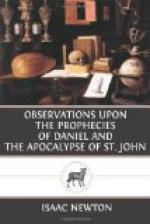in his second Sermon or Oration on the praises of
the holy Martyrs of
Christ, he thus addresses
them:
We entreat you most holy Martyrs, to
intercede with the Lord for us miserable sinners,
beset with the filthiness of negligence, that he would
infuse his divine grace into us: and afterwards,
near the end of the same discourse;
Now ye most
holy men and glorious Martyrs of God, help me a miserable
sinner with your prayers, that in that dreadful hour
I may obtain mercy, when the secrets of all hearts
shall be made manifest. I am to day become to
you, most holy Martyrs of Christ_, as it were an
unprofitable and unskilful cup-bearer: for I
have delivered to the sons and brothers of your faith,
a cup of the excellent wine of your warfare, with the
excellent table of your victory, replenished with
all sorts of dainties. I have endeavoured, with
the whole affection and desire of my mind, to recreate
your fathers and brothers, kindred and relations, who
daily frequent the table. For behold they sing,
and with exultation and jubilee glorify God, who has
crown’d your virtues, by setting on your most
sacred heads incorruptible and celestial crowns; they
with excessive joy stand about the sacred reliques
of your martyrdoms, wishing for a blessing, and desiring
to bear away holy medicines both for the body and
the mind. As good disciples and faithful ministers
of our benign Lord and Saviour, bestow therefore a
blessing on them all: and on me also, tho weak
and feeble, who having received strength by your merits
and intercessions, have with the whole devotion of
my mind, sung a hymn to your praise and glory before
your holy reliques. Wherefore I beseech you stand
before the throne of the divine Majesty for me
Ephraem,
a vile and miserable sinner, that by your prayers
I may deserve to obtain salvation, and with you enjoy
eternal felicity by the grace and benignity and mercy
of our Lord and Saviour
Jesus Christ, to whom
with the Father and Holy Ghost be praise, honour and
glory for ever and ever_. Amen.
By what has been cited out of Basil, the two
Gregories and Ephraem, we may understand
that Saint-worship was established among the Monks
and their admirers in Egypt, Phoenicia,
Syria and Cappadocia, before the year
378, this being the year in which Basil and
Ephraem died. Chrysostom was not much
later; he preached at Antioch almost all the
time of Theodosius the great, and in his Sermons
are many exhortations to this sort of superstition,
as may be seen in the end of his Orations on S. Julia,
on St. Pelagia, on the Martyr Ignatius,
on the Egyptian Martyrs, on Fate and Providence,
on the Martyrs in general, on St. Berenice
and St. Prosdoce, on Juventinus and Maximus,
on the name of Coemetery, &c. Thus in
his Sermon on Berenice and Prosdoce:
Perhaps, saith he, you are inflamed with




